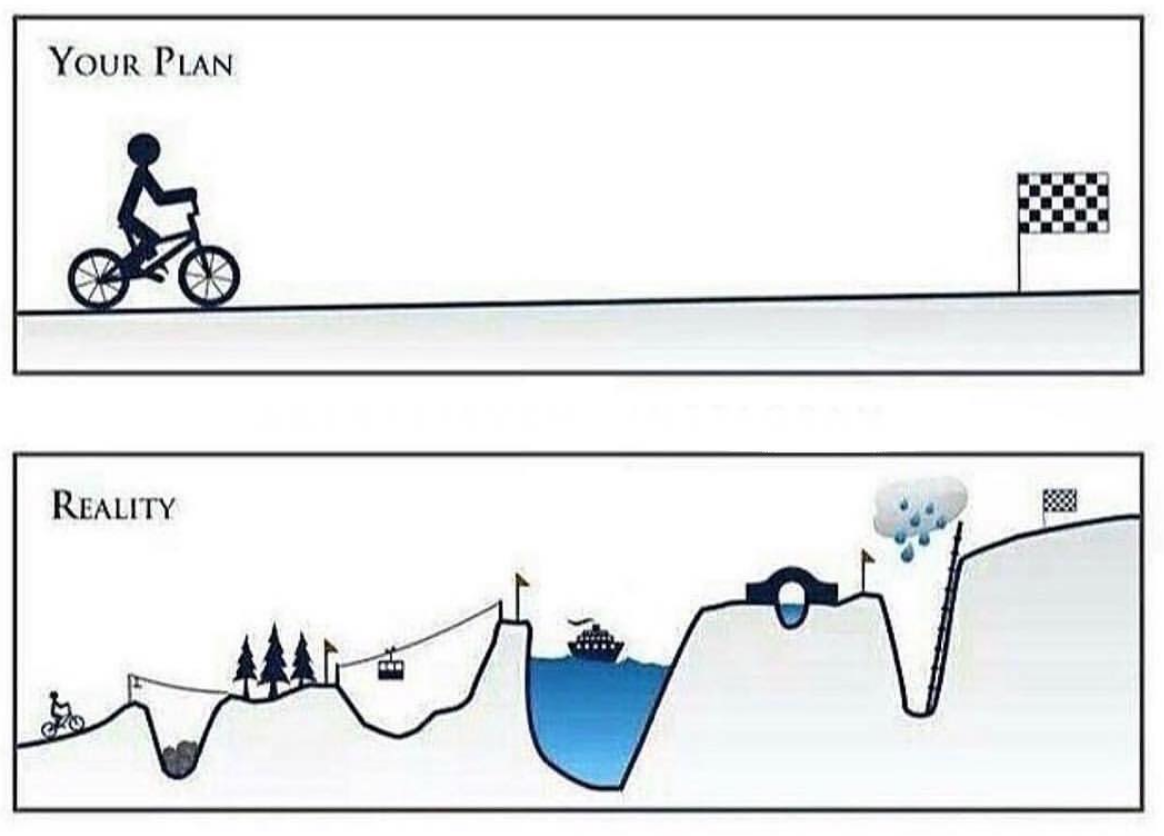Note: My articles often contain links to companies I invest/have stake in, or am an affiliate for, meaning we get a commission at no cost to you. I never promote anything I haven't used, or invested in, but since my tagline is to question everything, good to start here! Please see my disclosure page for more.
The more I know of the military, the more I want to hire them.
Dedication.
Drive.
Team work.
Focus.
Persistence through difficulty.
Training.
That's a winning skill set. And yet, US Military.. you're not very good (AT ALL) at helping your members transition. They serve for us, maybe we should serve them a bit better.
So, here's what I would do if I was talking to my loved ones about getting out and moving on up that corporate ladder.... (Honestly - if you're not military you need to read this too).
Transitioning from the military to civilian life IS tough. The two worlds have minimal overlap. As both a hirer of vets and a family member of one, I’ve seen it go incredibly well, with transitioning service members landing high six figure jobs that double their military income, in the field of their choice...
BUT I’ve also watched former soldiers, sailors, and airmen be taken advantage of and miss out on much opportunity.
Why?
It's in your nature as military to be humble, team oriented, focused on the we not the self, and guess what? In corporate America, unfortunately, that isn't the same creed. In fact in a new job negotiation if you don't ask for it, you probably won't get it.
So here's my top three to-do's for every service member when it’s time to trade in the camouflage.
RULE NUMBER 1:
Get An Education - If you can, use your GI Bill. Use every cent of it. Ideally I would try to go to school WHILE you are active duty. You earned it and it will teach you the language of business.
Think about it like this, have you ever been in Mexico and negotiated to buy a souvenir in your broken Spanish? Have you ever thought, man I am getting the gringo price? As a Latina - I'll tell you, you are. Why? Because they know you don't understand it's true worth, you don't know how to play the game. You don't speak their language. It's the same with business. You don't know (yet) about variable comp plans, vested equity, negotiating vacation, % matching on 401ks, VP vs SVP vs Director vs MD, guarantees etc. That's ok. Go to school and you'll speak the language, which means you will get a better deal. Always.
RULE NUMBER 2:
Start Looking Early - The military is unlike corporations, in the military almost everyone eventually is assumed to 'get out.' Thus, it's ok to start looking for new options early, in fact, it's crucial. The literal worst thing you can do is get out of the military without options. You lose the high ground. When you are still in, you don't have to worry about a paycheck so you can be patient, waiting for the exact right moment to pull the trigger as opposed to making a panicked emotional decision.
RULE NUMBER 3:
Play the Field - When you start looking, you may be tempted to say yes to the first thing that comes along. Defense contractor reaches out, give you a good enough opportunity, it's easy. Why not take it? Here's the problem, you have no idea what else is out there. This is your best shot to make a great transition, maybe a pivot, maybe a complete career change don't pigeon hole yourself.
(Sidenote: Defense contractors make an obscene amount of money, I would negotiate your salary LIKE CRAZY with them).
Play the slow game.
Any company that truly wants you now is going to want you later.
So make yourself go through the thought process of what would you do if you could do anything? Sit, drink a beer on your porch, ruminate on that. Write down all the things that interest you. Then go to your LinkedIn and search people in those spaces, reach out. Then go to your friends who have gotten out ask them if they know anyone in that industry.
RULE NUMBER 4:
Leverage Your Crew: I've realized the military is similar to a fraternity or a college sports team, you guys stick together. That means when you are considering leaving reach out to former military people first. They LOVE telling you the inside secrets just about as much as they love hiring fellow veterans.
Make it a game, and scroll through your LinkedIn noting all your former contacts and what they are doing today. Reach out to at least 10 of them to grab a coffee or a VTC. Then do one more thing, go to that dream job list of yours and reach out to two to three of those humans who have jobs you could only dream about. Ping them. See what happens. Then email me c@codiesanchez.com to tell me what happened. #yourewelcome
RULE NUMBER 5:
First Offer Is Never Final Offer - You followed the rules, you got THE JOB you want. Now you have the offer. Remember - Any job offer negotiation is kind of like how you text your friends to come out one night and they say;
"No I can't."
"No I better not."
"No I probably shouldn't."
And finally.. "ok where am I meeting you?"
Same with a job offer, it's the start of a conversation. It's not a final mandate. Never accept an employers first offer. Always negotiate. There is ALWAYS wiggle room. And the worst thing that can happen is they say no that's a final offer. Think of it this way, picture them chuckling at you because you didn't negotiate instead of assuming they'll think it's disrespectful you did negotiate. (Here's how I negotiate: --> click here).
EXTRA BONUS POINTS: These tools are here for you. Why not use?
Sometimes it's best to keep it stupid simple.. aka LinkedIn.
TOOL 1:LinkedIn <http://www.linkedin.com>
LinkedIn is the Facebook of business professionals around the world. If you don’t have an up to date profile (or a profile at all), your first step should be making your LinkedIn page shine like your Formal Dress shoes. And remember, only about 3% of the population has served in the military, so most recruiters and hiring managers won’t know what you’re talking about if you write using military jargon like “promoted to E8” or “served as battery commander.” You’ll need to translate your experience into business language, while at the same time talking up your experience as much as you can without being dishonest (when it comes to finding a job, you are your best advocate; this isn’t time to be modest).
“LinkedIn is the Facebook of business professionals around the world.”
Now that your profile is all spiffed up. Remember, there are two ways to learn, by spending years doing it or by listening to those who have spent years doing it.
Then you learn in half the time.
Use LinkedIn to expand your network.
TOOL 2. Veterati <http://www.veterati.com>
Veterati is a free mentoring platform for service members, veterans, and their spouses. What I love about this site is that it connects you directly with someone who is an expert in their field, and who cares enough to volunteer their time to help you find a job.
"Learn by listening to those who have spent years doing."
Once you fill out a short profile, Veterati will suggest several mentors who might be a good fit for you. You can read their bios, and then schedule a phone call based on their availability. After that, it’s up to whatever the two of you want to talk about, and how they can best help you find a job. Often that includes resume reviews, personal introductions to some of their industry connections, and mock interviews.
Take advantage of the resources that only you have access to as veterans.
TOOL 3: Hiring Our Heroes Corporate Fellowship <http://www.hiringourheroes.org/fellowships/>
The Hiring Our Heroes (HOH) Corporate Fellowship program is one of the best kept secrets of military transitioning. With programs at bases across the United States, HOH is a partnership between the military, industry-leading corporations, and the U.S. Chamber of Commerce that provides a competitive 12 week fellowship during your last months of service. Corporate partners vary each year, and include top companies like Boeing, Amazon Corporate, and Point B Consulting. Many companies report a 95% hire rate after the fellowship is complete, but the application process for HOH is competitive. Prepare.
You served, now is your time to reap.
Remember, don’t compromise. You have served your country well, built leadership and technical skills, and now, you’re on the path to an incredible civilian career. You’ll be surprised at how quickly you learn this new language of business. And in fact, you just may take it over.
Codie Sanchez
--> Stay in touch- Click here <https://codiesanchez.leadpages.co/codie-sanchez/>
Twitter <https://twitter.com/Codie_Sanchez> - Facebook <https://www.facebook.com/threadsrefined> - Instagram <https://www.instagram.com/codiesanchez/> - LinkedIn <https://www.linkedin.com/in/codiesanchez>
Codie Sanchez
Cannacurious? Here's our contrarians' guide to investing and getting a career into cannabis, or find out more information below:
IG: @codiesanchez
EEC: www.entourageeffectcapital.com
This article is presented for informational purposes only, is an opinion, and is not intended to recommend any investment, and is not an offer to sell or the solicitation of an offer to purchase an interest in any current or future investment vehicle managed or sponsored by Entourage Effect Capital, LLC or its affiliates. Any such solicitation of an offer to purchase an interest will be made by a definitive private placement memorandum or other offering document.




